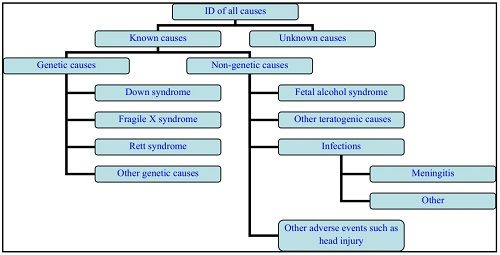Difference between Intellectual Disability and Learning Disability

Aetiologies of intellectual disability
Difference between Intellectual Disability and Learning Disability is well defined in science and psychology ; yet people often mistake one for the other.
Intellectual Disability is a Neurodevelopmental Disorder that affects one’s social, academic, communication, and daily life functions. Until few years, Intellectual Disability was wrongly called Mental Retardation. However, with the advancement in the classification and taxonomy of disorders, the term “Intellectual Disability” was coined and is now used for people who have an intelligence level below average.
Learning Disability, on the other hand, is a condition which affects the different areas of learning and interferes with the academic achievements of the individual. It includes reading, writing, comprehending and organizing language and mathematics. Learning Disabilities were previously mistaken to be intellectual faults. But with increase in the medical and psycho-social advancements, it has been proved that just a low I.Q. level is not enough to indicate Learning Disability.
This statement can be justified by saying that world famous personalities like Albert Einstein and Walt Disney were victims of Learning Disability in their childhood. However, their future achievements are known to all and show that they were intellectually above average.
The confusion between the two terms had been prominently seen in a programme conducted by St. Lawrence College in 2011 where it talked about a “College Program launched for the people having Learning Disability”; however, it was a venture for the intellectually disabled people.1 The mistake was stark and grabbed the attention of many.
One reason that makes the two conditions similar is the genetic influence. The recent decades have made significant advancement in establishing the role of genes in developing Intellectual Disabilities, Developmental Disabilities and Learning Disabilities in children. Extensive family studies have come up with evidences of the genetically influenced Disabilities (learning, intellectual and developmental). The studies conducted in the US by the Agency for Healthcare Research and Quality (AHRQ) showed the clinical abundance of gene utility in developing disabilities. 2
What differentiates Intellectual Disability from Learning Disability
There are plenty of factors that differentiates Learning and Intellectual Disability. Some of them have been discussed below.
1. Areas of Dysfunction :-
An individual with an I.Q.3 below 70 would be labelled as intellectually disabled. An overall subaverage intellect usually affects all major areas of functioning including
- Communication
- Self help
- Academic achievements
- Sensory and motor skills
- Memory
- Reasoning and decision making.
Learning Disability is confined to difficulties in areas pertaining to learning skills like
- reading,
- writing,
- understanding and
- visual processing.
The I.Q. of a learning disabled person may be average (or sometimes above average) and he/she may show no difficulty in communication or self help skills.
2. Typical features :-
Intellectual Disability can be diagnosed earlier than learning disability.
The DSM 5 4 has set three differential criteria for Intellectual Disability namely:
- Deficit in intellectual functions — reasoning, problem solving, listening,abstract thinking, academic and social learning.
- Deficits in adaptive functioning — difficulty in adapting to the environment and developmental standards inappropriate to age and culture.
- The onset of 1 and 2 in childhood or adolescence.
The features of Learning Disability circles around reading, writing and comprehension. A learning disabled can be fully functioning as an individual in all aspects except for academic areas. The characteristic features include
- Poor reading/writing/comprehension/mathematical skills
- Poor reading/writing/decoding fluency
- Inability to compose, complete and organise written information
- Poor handwriting and spelling
- Difficulty memorizing and retaining information
- Poor mathematical skills
3. Classifications :-
On the basis of I.Q., intellectual disability is classified into the following subtypes. The severity of disability increases with decreasing I.Q.
- Mild intellectual disability — Q. 50-70
- Moderate intellectual disability — Q. 35-49
- Severe intellectual disability — Q. 20-34
- Profound intellectual disability — Q. less than 20
Learning disability on the other hand is classified on the basis of the area of difficulty. The subtypes of Learning Disability are
- Dyslexia — characterised by difficulty in reading and language based processing abilities.
- Dysgraphia –characterised by difficulty related to writing skills including poor handwriting and weak motor skills
- Dyscalculia — characterised by difficulty in understanding and solving mathematical problems.
- Other specific learning disabilities — includes Auditory Processing Disorder, Language Processing Disorder, Nonverbal Learning Disability.5
4. Impact on normal functioning :-
There is a huge difference between intellectual disability and learning disability when it comes to daily life functions. An intellectually disabled finds it very difficult to perform normal tasks like other people of the same age. Workaday jobs like self care, communication, interpersonal relationships, making friends, average academic achievements — gets dysfunctional. The degree of dysfunction varies of course. A mildly disabled individual will have less difficulty in his normal functions than a severe or profound intellectually disabled one. Some people even need continued external caregiving throughout his/her life.

The impact of learning disability on daily life functions is relatively less. Which is why early diagnosis of Learning Disability is rare. Academic underachievement is what leads to the investigations. The person otherwise may be perfectly normal in terms of social and physical development.
5. Treatment :-
The special education and therapeutic methods followed for treating the intellectually and the learning disabled are different. As discussed earlier, the intellectually disabled individuals have dysfunctions in basic life skills like communication, self help or academic achievements. The treatment methods for intellectual disability includes
- Speech therapy
- Communication Interventions
- Behaviour therapies
- Medication
It is important to mention here that the treatment strategies differ according to the severity of the disability. A mild intellectually disabled person is ideally capable of taking his/her own medical and financial responsibilities. The occupational and the behavioral therapies they undergo are different from the severe or profoundly disabled individuals.
Learning Disability, as we know, is manifested in certain specific areas like reading, writing, maths, spellings, etc.. Barring that, all other functional areas of the person may be intact.
So the treatment of Learning Disabled focuses on improving only the specific area and an overall therapy for communication or life skills may not be required. The special education techniques include :
For Dyslexia
- Special teaching techniques providing multi sensory experiences and feedbacks.
- Classroom modifications catering to individual needs.
- Using technological ways like listening to books on tape or using computerised spell check softwares.
For Dysgraphia
- Special tools like oral exams instead of written ones.
- Using audio-visual mode of teaching.
For Dyscalculia
- Visual techniques for learning
- Using memory aids and computers for solving problems.
| Summary of the points of difference between Intellectual Disability and Learning Disability | |
| Criteria of difference | Intellectual Disability |
| Area of difficulty | Daily life activities, self help and communication |
| Features | Deficits in reasoning, problem solving, abstract thinking,academic and social learning. |
| Classification | Based on levels of I.Q., Intellectual Disability is classified as mild, moderate, severe or profound. |
| Impact on normal functioning | Severe and profoundly disabled people cannot function normally in any area. |
| Treatment | Behavioural therapies, special education depending on the severity of the disability. |
There are very few ways in which Learning Disability can be associated with Intellectual Disability. One thing is that out of the different problems that intellectually disabled people face, difficulty in reading or writing may be one. But if we look into the causal factors, they are not the same. The specific areas of brain that are responsible for causing Learning Disorders/Disabilities are different from the physiological factors causing Intellectual Disorders. However, extensive researches are still going on that would hopefully ascertain the relationship between them in the coming years.
- Difference between Ego and Self Respect - August 16, 2017
- Difference between Intellectual Disability and Learning Disability - August 4, 2017
- Difference between Soylent and Ensure - August 3, 2017
Search DifferenceBetween.net :
 Email This Post
: If you like this article or our site. Please spread the word. Share it with your friends/family.
Email This Post
: If you like this article or our site. Please spread the word. Share it with your friends/family.
2 Comments
Leave a Response
References :
[0]1http://www.kingstonthisweek.com/2011/01/20/differences-between-learning-and-intellectual-disabilities
[1]2 https://www.ncbi.nlm.nih.gov/books/NBK310466/ https://www.ncbi.nlm.nih.gov/pubmed/6347551
[2]3https://en.wikipedia.org/wiki/Intelligence_quotient
[3]4 DSM 5
[4]5https://ldaamerica.org/types-of-learning-disabilities/
[5]https://www.intechopen.com/books/recent-advances-in-autism-spectrum-disorders-volume-i/pre-existing-differences-in-mothers-of-children-with-autism-spectrum-disorder-and-or-intellectual-di
[6]http://qaspire.com/tag/learning/
[7]https://engaged-brains.wikispaces.com/Learning+Disabilities


Thankyou very much for this information. Also included placement in school for children with ID and LD.
Also included reference literature.
God bless you
Perfect information,you have brought out the information very well plus the perfect examples
Thanks alot